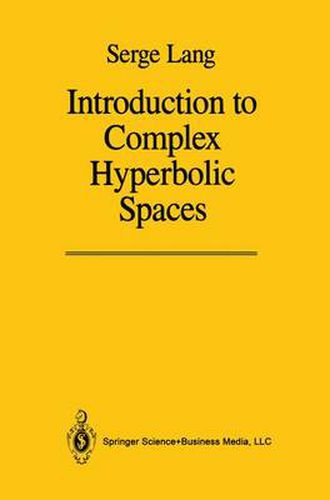Readings Newsletter
Become a Readings Member to make your shopping experience even easier.
Sign in or sign up for free!
You’re not far away from qualifying for FREE standard shipping within Australia
You’ve qualified for FREE standard shipping within Australia
The cart is loading…






This title is printed to order. This book may have been self-published. If so, we cannot guarantee the quality of the content. In the main most books will have gone through the editing process however some may not. We therefore suggest that you be aware of this before ordering this book. If in doubt check either the author or publisher’s details as we are unable to accept any returns unless they are faulty. Please contact us if you have any questions.
Since the appearance of Kobayashi’s book, there have been several re sults at the basic level of hyperbolic spaces, for instance Brody’s theorem, and results of Green, Kiernan, Kobayashi, Noguchi, etc. which make it worthwhile to have a systematic exposition. Although of necessity I re produce some theorems from Kobayashi, I take a different direction, with different applications in mind, so the present book does not super sede Kobayashi’s. My interest in these matters stems from their relations with diophan tine geometry. Indeed, if X is a projective variety over the complex numbers, then I conjecture that X is hyperbolic if and only if X has only a finite number of rational points in every finitely generated field over the rational numbers. There are also a number of subsidiary conjectures related to this one. These conjectures are qualitative. Vojta has made quantitative conjectures by relating the Second Main Theorem of Nevan linna theory to the theory of heights, and he has conjectured bounds on heights stemming from inequalities having to do with diophantine approximations and implying both classical and modern conjectures. Noguchi has looked at the function field case and made substantial progress, after the line started by Grauert and Grauert-Reckziegel and continued by a recent paper of Riebesehl. The book is divided into three main parts: the basic complex analytic theory, differential geometric aspects, and Nevanlinna theory. Several chapters of this book are logically independent of each other.
$9.00 standard shipping within Australia
FREE standard shipping within Australia for orders over $100.00
Express & International shipping calculated at checkout
This title is printed to order. This book may have been self-published. If so, we cannot guarantee the quality of the content. In the main most books will have gone through the editing process however some may not. We therefore suggest that you be aware of this before ordering this book. If in doubt check either the author or publisher’s details as we are unable to accept any returns unless they are faulty. Please contact us if you have any questions.
Since the appearance of Kobayashi’s book, there have been several re sults at the basic level of hyperbolic spaces, for instance Brody’s theorem, and results of Green, Kiernan, Kobayashi, Noguchi, etc. which make it worthwhile to have a systematic exposition. Although of necessity I re produce some theorems from Kobayashi, I take a different direction, with different applications in mind, so the present book does not super sede Kobayashi’s. My interest in these matters stems from their relations with diophan tine geometry. Indeed, if X is a projective variety over the complex numbers, then I conjecture that X is hyperbolic if and only if X has only a finite number of rational points in every finitely generated field over the rational numbers. There are also a number of subsidiary conjectures related to this one. These conjectures are qualitative. Vojta has made quantitative conjectures by relating the Second Main Theorem of Nevan linna theory to the theory of heights, and he has conjectured bounds on heights stemming from inequalities having to do with diophantine approximations and implying both classical and modern conjectures. Noguchi has looked at the function field case and made substantial progress, after the line started by Grauert and Grauert-Reckziegel and continued by a recent paper of Riebesehl. The book is divided into three main parts: the basic complex analytic theory, differential geometric aspects, and Nevanlinna theory. Several chapters of this book are logically independent of each other.